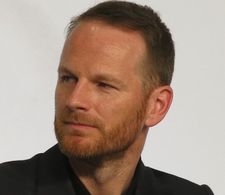 |
| Isabelle Huppert and Gabriel Byrne at the Cannes press conference for Louder Than Bombs |
For Gabriel Byrne, the star of Norwegian director Joachim Trier’s family drama Louder Than Bombs, the eternal tussle at the heart of the film has strong resonances.
Accompanied at a meet the Press encounter in Cannes today (Monday 17 May) by his co-star Isabelle Huppert, the director Trier and newcomer Devin Druid, he said there was constant conflict between home and work.
“That brings with it attendant feelings of guilt and later regret. I am sure many parents can identify with this. And for a family who are dealing with grief how you put your life together again can be a very complex journey,” he said.
“Another theme is family and the passage of time. Anyone who has looked at a family video or DVD will experience feelings about the way you remember things and the way they actually were.
“There is no rulebook about parenting. A child wants to express freedom emotionally and physically. Trying to act like a teenager when you are not is a sign of condescension and most youngsters would reject that.”
Huppert concurred, adding “The rhythm of work is not the same as for your private life and that can strike a discord.”
 |
| Norwegian director Joachim Trier makes his English-language debut with Louder Than Bombs Photo: Richard Mowe |
Byrne drew on the relationship with his own father. “When I was growing up the definition of masculinity was silence. He was trying to guess the identity of his son and as a son you were trying to work out who your father was. I never listened to my father, but since he died I have never stopped listening to him.”
Trier admitted to watching a lot of American films when he was growing up and his parents were embroiled in a divorce. He cited Kramer vs Kramer as having made a big impact, as well as The Breakfast Club when he was a teenager. A lot of those kinds of subject seem to have moved to television but we wanted to claim them back for the big screen.”
With his writing partner Eskil Vogt, he started off without a plot but built the characters during a brainstorming year. “It was only then that we started to work on a plot to encompass them,” he said. Vogt added: “We wanted to explore all that is unsaid in a family - the different stories and generations - and the theme of grief gave us a direction.”
Trier has leavened drama with humour because ‘dealing with grief doesn’t mean you have to be serious all the time. In the darkest moments there is hope and humour.”





















